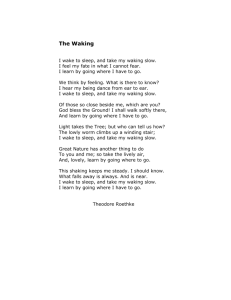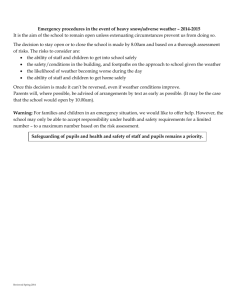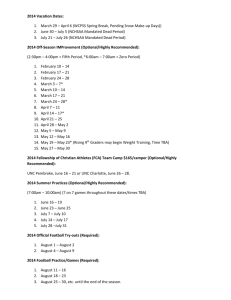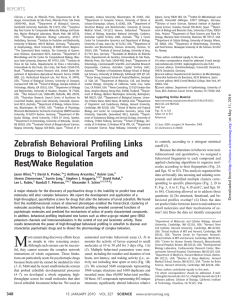Teaching Brain - The Teachable Moments
advertisement
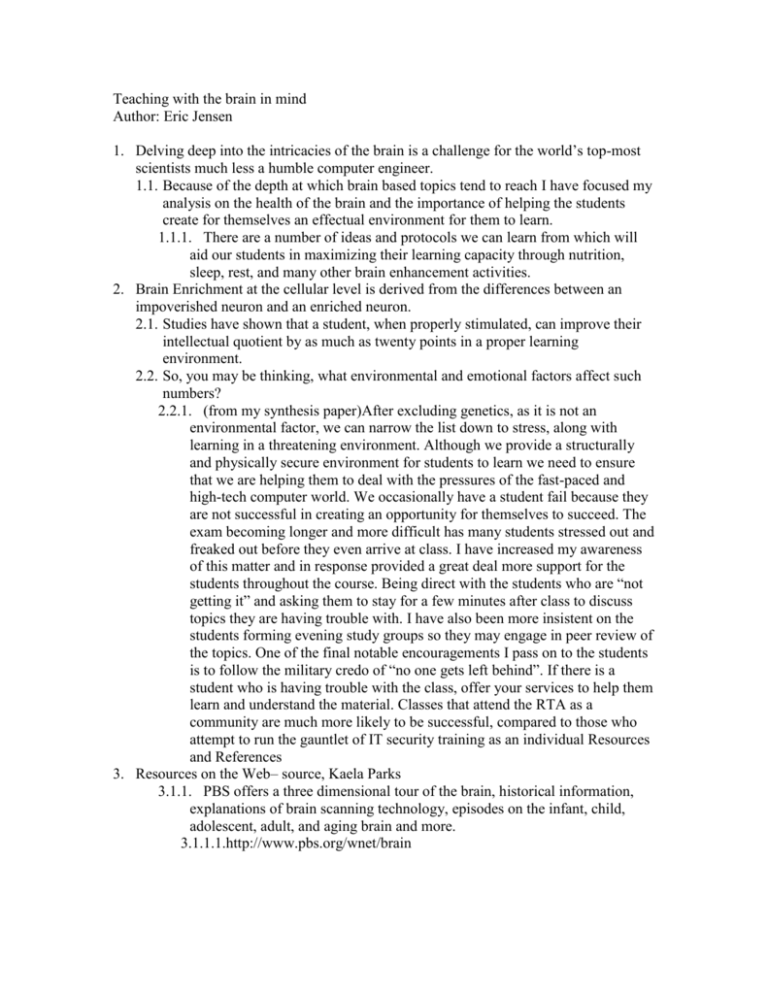
Teaching with the brain in mind Author: Eric Jensen 1. Delving deep into the intricacies of the brain is a challenge for the world’s top-most scientists much less a humble computer engineer. 1.1. Because of the depth at which brain based topics tend to reach I have focused my analysis on the health of the brain and the importance of helping the students create for themselves an effectual environment for them to learn. 1.1.1. There are a number of ideas and protocols we can learn from which will aid our students in maximizing their learning capacity through nutrition, sleep, rest, and many other brain enhancement activities. 2. Brain Enrichment at the cellular level is derived from the differences between an impoverished neuron and an enriched neuron. 2.1. Studies have shown that a student, when properly stimulated, can improve their intellectual quotient by as much as twenty points in a proper learning environment. 2.2. So, you may be thinking, what environmental and emotional factors affect such numbers? 2.2.1. (from my synthesis paper)After excluding genetics, as it is not an environmental factor, we can narrow the list down to stress, along with learning in a threatening environment. Although we provide a structurally and physically secure environment for students to learn we need to ensure that we are helping them to deal with the pressures of the fast-paced and high-tech computer world. We occasionally have a student fail because they are not successful in creating an opportunity for themselves to succeed. The exam becoming longer and more difficult has many students stressed out and freaked out before they even arrive at class. I have increased my awareness of this matter and in response provided a great deal more support for the students throughout the course. Being direct with the students who are “not getting it” and asking them to stay for a few minutes after class to discuss topics they are having trouble with. I have also been more insistent on the students forming evening study groups so they may engage in peer review of the topics. One of the final notable encouragements I pass on to the students is to follow the military credo of “no one gets left behind”. If there is a student who is having trouble with the class, offer your services to help them learn and understand the material. Classes that attend the RTA as a community are much more likely to be successful, compared to those who attempt to run the gauntlet of IT security training as an individual Resources and References 3. Resources on the Web– source, Kaela Parks 3.1.1. PBS offers a three dimensional tour of the brain, historical information, explanations of brain scanning technology, episodes on the infant, child, adolescent, adult, and aging brain and more. 3.1.1.1.http://www.pbs.org/wnet/brain 3.1.2. The Society for Neuroscience offers Brain Facts: A primer on the Brain and Nervous System as well as news briefings and links to brain research related journals and publications. 3.1.2.1.http://www.sfn.org 3.2. education is a website devoted to practical classroom applications for current brain research findings. Educational settings that take brain functioning and neurobiological development into account could constitute an additional type of intervention, a way to promote full and healthy development through a use of activities that stimulate the developing brain. 3.2.1.1.http://www.brains.org/ 3.3. The Center for Applied Special Technology CAST offers many resources. 3.3.1.1.www.cast.org 3.4. Your Amazing Brain includes information on topics including Brain and Body, Super Senses, Inside your Brain, Love and Sex, Your Memory, and Test Yourself. 3.4.1.1.www.youramazingbrain.org 3.5. Brain Connection features an image gallery as well as links to articles and much more. 3.5.1.1.http://www.brainconnection.com 3.6. The Dana Foundation is a private philanthropic organization with interests in science, health, and education. It was founded in 1950. Focuses include Arts Education, Immunology, and a Brain Center that serves as a gateway to brain information and resources. 3.6.1.1.http://www.dana.org/braincenter.cfm 3.7. Neuroscience for Kids is one of my favorite sites. It was started in 1996 by Eric H. Chudler, Ph.D. who received a Science Education Partnership Award from the National Center for Research Resources to work with science teachers to create the materials on Neuroscience for Kids. 3.7.1.1.http://faculty.washington.edu/chudler/neurok.html 4. Does time of day affect the learning process? 4.1. I am an evening person. 9:00am is a good time to wake up and 2:00am is a good time to go to sleep. I grew up on a farm waking up the first 18-years of my life (ok, I guess my parents let me sleep in as an infant) at 5:00am. I HATED it! I was brainwashed by the age of eight so I never really fought waking up early and just lived in misery throughout my childhood, always tired, difficulty with sleeping and difficulty waking up. When I started college and moved away from home all my classes started after 9:00am. Wow, what a difference! I was on a comfortable sleeping schedule, I did not have to wake up and milk the cows every morning, and I had all evening to fall asleep naturally doing my homework, I can only begin to explain the positive effects my new schedule had on my academic performance. 5. How does persistence vary among students? 5.1. This variance drives me nuts. Here is the all-to-common story: I had a student who was applying very little effort and yet was maintaining a B/C average throughout the entire semester. Suddenly the last three weeks of class they just stopped coming. During this period they missed a final exam (worth a significant portion of their grade) that dropped their grade below a D. I sent them several emails requesting their status and encouraging them to get in touch with me to arrange an alternate testing method. I did finally hear back from the student (several months after the course ended), they thanked me for everything and informed me “school just wasn’t right for them”. It troubles me when the ones who have natural talent become bored with learning and throw in the towel so easily. On a positive note, at the other end of the perseverance scale, I truly enjoy seeing the ones who have everything working against them pound through the semester and successfully complete the course. Although I tell them in words, they have no idea how much I sincerely admire them for their efforts.

